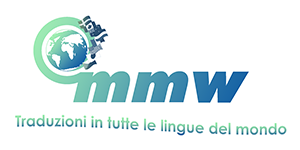Due to the globalisation process which is increasingly affecting transfers of students and professionals abroad or emigration of foreigners to Italy, more and more requests for recognition of educational qualifications obtained both abroad and in Italy, in another country are being made.
In fact, often it is not only students that move from or to another country to study or to get a Master’s or other type of degree that are involved but also affirmed professionals who need to have their professional or educational qualifications recognised abroad for work purposes.
MMW traduzioni will support you throughout the procedure for having your qualification recognised with both the authorities in Italy and elsewhere, showing you how to comply with all the legal provisions involved.
First of all, in order for a qualification to be recognised, it is mandatory that all the titles are officially translated by an official translator. Nonetheless, private domestic or foreign schools often only require a translation certified by the translator.
Generally speaking, recognition of qualifications other than university ones may be required:
a) to enrol in a secondary school (lower secondary school or upper secondary school) or for professional training courses;
b) to enrol in university;
c) to carry out a job that requires a diploma.
Applications for recognition that an educational qualification obtained abroad or in your country of origin is of equal value and effectiveness (called equipollence) must be made through the Consulate Students’ Department by producing the following documentation:
a) diploma or certificate in original or duly officialised form;
b) an official translation with a legalisation stamp or apostille of the Italian document that fully complies with the original text.
Applications for enrolment of foreign students in primary or secondary schools
Foreign primary or secondary school students that intend to apply for enrolment in Italian schools may make their application at any time of the school year; in the event any personal records are missing, incomplete or irregular, applications may be made with reservation and qualifications may be obtained once personal details have been verified.
Lower secondary school
In order to enrol, children must have finished primary in Italy (or have an equivalent certificate from their country of origin) and present:
a) a certificate of compulsory vaccinations;
b) a birth certificate;
c) documentation certifying the grades achieved in your country of origin.
Children will be enrolled in the year corresponding to their age, unless the teaching board decides otherwise due to a different educational system, preparation of a child, the studying involved or qualification held.
Upper secondary school
Applications should be made directly to the school of choice, as long as the child meets the following requirements:
a) he/she is of an age no lower than that required to enrol at the school in question;
b) his/her educational qualifications from foreign schools have been recognised by the Consulate Students’ Department;
c) he/she is prepared in the educational programme for the year in which he/she wishes to enrol.
The class board is responsible for deciding whether or not to accept applications and if an entrance test is required.
Enrolment in a university degree course
Applications to enrol may only be made for one degree course by non-Europeans regularly living in Italy, Europeans residing anywhere and political refugees with an educational qualification obtained abroad or a diploma for upper secondary school education from an Italian school abroad.
The following must be attached to applications:
a) secondary school qualification issued by foreign authority with an official translation into Italian;
b) certificate showing that the academic test has been passed, if required by the University in the country of origin.
Applications to shorten a course due to the fact that a student has already taken exams in their country of origin require the following:
a) certificate of secondary school qualification (original for non-Europeans; authenticated photocopy for Europeans);
b) declaration of secondary school qualification equipollence issued by the Italian Consular Representation in the country in which the qualification was achieved;
c) a plan of university studies (subjects taken and hours of attendance for each, exams taken and relative mark);
d) programme of exams taken.
Those who have obtained a diploma for secondary school education in Italy may enrol at University in the same way as Italians.
Recognition of university qualifications achieved abroad
Recognition of qualifications is required:
a) to enrol for a Master’s degree;
b) to continue university studies (Master’s, PhD);
c) to get any job requiring academic qualifications.
Students can obtain equipollence for a university qualification achieved abroad by presenting the relative documentation and application for recognition to the Italian Consular Representation in their country of origin if they have not yet arrived in Italy.
People regularly residing in Italy can directly apply for equipollence of their qualifications achieved abroad from the University by presenting:
a) certificate of secondary school qualification (original for non-Europeans; authenticated photocopy for Europeans);
b) university qualification achieved (preferably original);
c) declaration of equipollence of both educational qualifications issued by the Italian Consular Representation in the country in which such qualifications were achieved;
d) a plan of university studies (subjects taken and hours of attendance for each, exams taken and relative mark);
e) programme of exams taken.
All the above must be translated and sworn in by an official translator.
Nonetheless, recognition of a degree, in other words the equipollence of academic qualifications, is not automatic and, according to Italian Law no. 148 of 11 July 2002, in some cases university studies must be integrated: in such cases, you are required to enrol in the University (taking a number of exams, discussing a dissertation and, at times, taking laboratories or carrying out internships).
The specific procedures entailed shall be decided by a Curricula Assessment Commission (foreign and Italian) and the University is required to notify the outcome of applications within 90 days.
Although sitting an Italian test is not compulsory, some universities require students to take an entrance exam.
